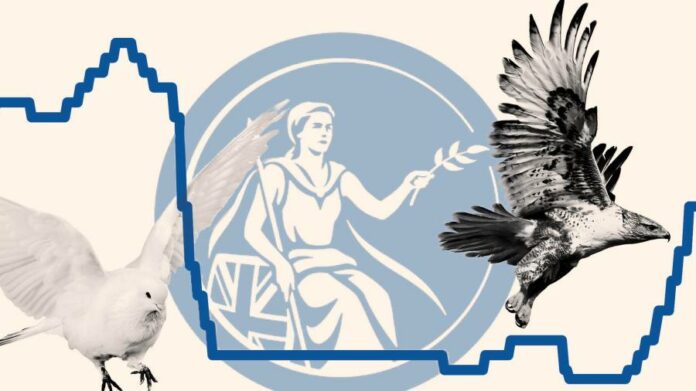A six week interlude has taken at least some of the heat out of the debate over UK monetary policy in the run-up to Thursday’s interest rate decision.
When the Bank of England’s nine rate-setters last met, in early November, they were under intense pressure to restore confidence in the UK’s economic management, after the market turmoil unleashed by the hastily reversed “mini”-Budget, and to keep pace with aggressive tightening by the European Central Bank and US Federal Reserve.
It duly delivered a 0.75 percentage point interest rate increase — the biggest in more than 30 years — taking the benchmark rate to 3 per cent.
Now, gilt markets have calmed; prime minister Rishi Sunak has set fiscal policy on a more orthodox path; and there is a chance that both the Fed and ECB will slow the pace of rate rises this week.
So too could the BoE. Investors are betting that the Monetary Policy Committee will opt for a 0.5 percentage point rate increase, rather than repeating last month’s outsized move. “Our sense is that a majority consider November’s 75bp move as an extraordinary one rather than the beginning of a new normal,” said Paul Hollingsworth, economist at BNP Paribas.
But with the UK facing both the worst growth outlook of any big economy, and some of the most persistent inflationary pressures, the decision will be finely balanced.
Analysts said there was potential for a three or even four-way split on the committee. The more hawkish members — such as Dave Ramsden and Jonathan Haskel — have argued that tightening should be front-loaded to bring inflation expectations under control and could vote for a bigger rise.
At the other extreme, Silvana Tenreyro has argued that the BoE has already done enough for inflation to fall below target, once the full effect of its recent tightening is felt, and Swati Dhingra has suggested that any further increase in borrowing costs will unnecessarily deepen and lengthen the impending recession.
Meanwhile, Andrew Bailey, BoE governor, has made it clear that “there will be more to do” to put inflation — which hit 11.1 per cent in October — on a sustainable path. He has been much less explicit about how fast, or how far, interest rates still need to rise, but when challenged by his predecessor, Mervyn King, acknowledged that the BoE viewed a recession as “part and parcel of the process needed to get inflation back to . . . 2 per cent on a sustainable basis”.
Developments since the MPC last met offer food for both doves and hawks on the committee.
There is some evidence to suggest headline inflation has now peaked — with oil prices lower, sterling stronger and surveys showing that companies are becoming less confident of their ability to raise prices.
But there are now signs of strong wage growth starting to push up the price of services — a worrying development for the BoE because it suggests inflation might not fall far enough even once the effects of the pandemic on supply chains and the Ukraine war on energy prices fade.
The contraction in GDP has also so far been smaller than the BoE predicted and, while chancellor Jeremy Hunt has announced a significant tightening of fiscal policy, it is unlikely to shift the bank’s thinking because the pain will mostly be felt after the next election, due by 2025.
“There is plenty of room for further disagreements amongst MPC members,” said Paul Dales, at the consultancy Capital Economics, who thinks the committee is likely to opt for a smaller rate increase this week and hint that “it is getting closer to the end of the tightening cycle”.
Two key data releases due early this week — the latest inflation reading and official figures on the state of the labour market — have the potential to swing the vote.
The single biggest worry for the BoE is that chronic labour shortages — caused in part by rising inactivity among older workers — will force employers to raise wages at a pace that would keep inflation high, if they also try to maintain their margins by raising prices to compensate.
“We have to raise interest rates further than we otherwise would to counteract that,” Bailey told the Lords economics affairs committee last month — while noting early signs of hiring pressures easing.
Whether the MPC decides to front-load rate rises, or to act more cautiously, the crucial question is how far it will ultimately go. Last month, the committee gave an unusually clear steer that investors had gone too far in betting that interest rates would rise as high as 5.25 per cent next year. It may be less explicit now that investors have pulled back, with current market pricing suggesting a peak just above 4.5 per cent.
But analysts believe the direction of travel will still be clear. “We think the overall message is likely to be that the MPC is not done yet,” Hollingsworth said.







